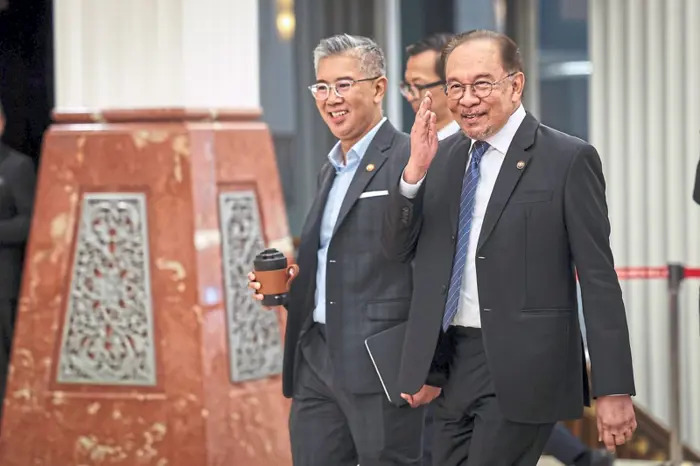
On point: Anwar and Zafrul after the special Dewan Rakyat meeting to address Trump’s tariffs. They have been working hard to communicate with the public on the issue. — Bernama
LET’S face it – the world economy will never be the same again – and that includes Malaysia as well – following the implementation of the reciprocal tariffs by the Trump administration even if they are reduced or eliminated.
Malaysia will face strong economic headwinds and while the ordinary Malaysian may still not feel it, they will eventually.
So it is better that our leaders prepare our citizens for the implications of the long-term shifts that are already challenging global trade dynamics and geopolitical trust.
Unfortunately, most of our Malaysian politicians are still engrossed in playing up inconsequential issues to win attention.
Some are still squabbling over whether they are more Malay or Malaysian while the world economy is crumbling.
The World Bank has projected our 2025 GDP growth rate to be reduced to 3.9%, lower than Bank Negara’s current projection of 4.5% to 5.5%.
Last week, Moody’s Investors Service said the tariff shocks posed a major threat to Malaysia’s sovereign credit ratings.
The ratings firm sees downside risks to its initial projection of 5% growth for Malaysia this year no thanks to global trade tensions.
There’s also a possibility that the government will increase spending to counter headwinds from US-imposed levies, Christian De Guzman, senior vice-president at Moody’s, said, according to Bloomberg.
“If the global economic outlook were to turn very significantly and the government would perhaps take measures to offset some of that weakening in the global economy, they could perhaps delay or postpone the petrol subsidy re-targeting,” he said.
He was referring to the government’s plans to end blanket subsidies for the country’s most popular gasoline by mid-year.
“The risks to fiscal consolidation are there,” he said in the interview on Monday.
Malaysia has since 2004 enjoyed an A3 rating at Moody’s – the highest among peers in developing South-East Asia.
The report said that while our credit score has withstood the fallout from the 2008 global financial crisis and the Covid-19 pandemic, the blow from US tariffs clouds the country’s prospects.
Moody, in fact, changed its outlook for Thailand to negative just last week, citing potential impact from higher levies.
Singapore Prime Minister Lawrence Wong, meanwhile, mastered the geopolitical narrative effectively to win handsomely in the 2025 elections.
I am not sure if our voters would want to hear the implications of tariffs for Malaysia as an issue at ceramah gatherings. Race and religion are likely to continue to be the selling point.
What is certain is that the majority of PAS leaders are not competent enough to talk about the economy, let alone negotiate in Washington DC.
In Singapore, government leaders are often cautious and measured in their speeches, preferring to assure and comfort their people. However, during the recent campaigning, Wong framed these developments not as distant economic shifts, but as immediate national concerns.
In simple language he frightened the voters sufficiently to send the message that they have to vote for PAP as an experienced and steady party in government, and that it was not the time to be politically adventurous.
Wong went on the offensive by tying renewed US tariffs directly to Singapore’s domestic wellbeing – highlighting potential disruptions to supply chains, cost of living pressures, and long-term economic competitiveness.
More critically, he used these threats to draw a stark contrast between his administration’s seasoned leadership and what he portrayed as the untested alternatives offered by the opposition.
The key points were on Singapore’s position in an increasingly unstable world, keeping jobs, a lower economic growth, and inflation – but also how to keep Singapore economically relevant and diplomatically balanced.
The election outcome underscored the strategy’s success: the PAP increased its vote share to 65.6% – up from 61% in 2020 – and secured 87 of 97 seats. Opposition gains remained modest, with the Workers’ Party continuing to hold a small but stable minority.
In Malaysia, Prime Minister Datuk Seri Anwar Ibrahim has spoken widely on the tariff issues and even convened a special Dewan Rakyat meeting to address our lawmakers on financial support for small and medium enterprises.
Investment, Trade and Industries Minister Datuk Seri Tengku Zafrul Aziz must be commended for his regular video-clips on the tariff issues with simple, easy to understand narratives without the economic jargon.





